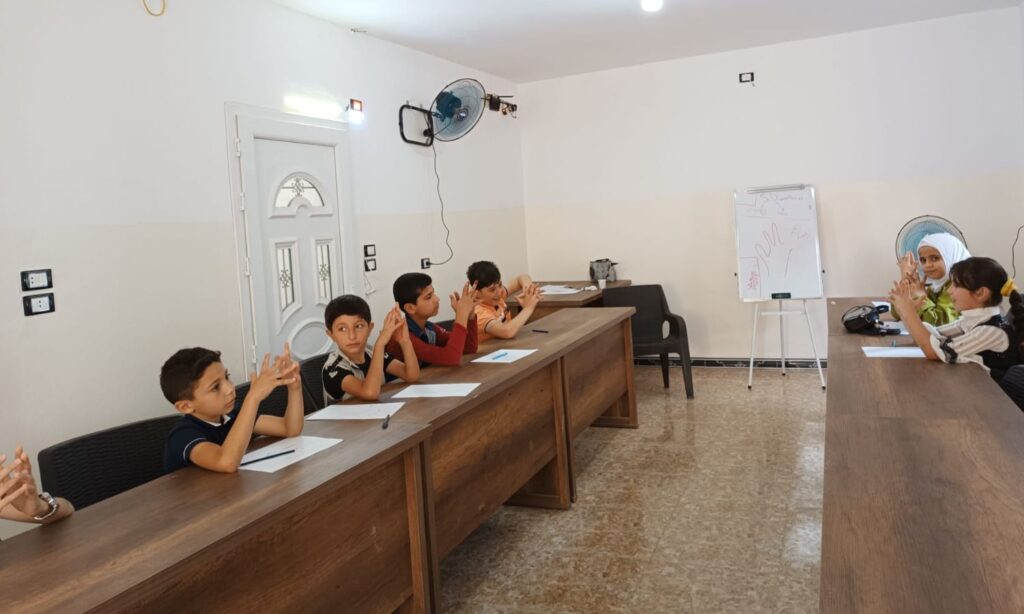Aleppo countryside – Abdul Karim al-Thalji
The Professional Academy for Sustainable Development in the city of Azaz, north of Aleppo, launched a series of training courses for children in order to help them keep pace with technological development and learn about modern digital programming mechanisms.
Specific training programs, according to those in charge of the academy, to teach children the Scratch program (children’s programming), mind games, intelligence, and mental arithmetic, in addition to teaching Arabic calligraphy and proper reading methods.
Hasnaa Issa, a displaced person from Eastern Ghouta, who registered her two daughters in the Scratch program, told Enab Baladi that she was encouraged by the fact that her two daughters have a background in this technology, noting that this program helps the child to design an animated story, such as cartoon films, by programming the image with sound, movements, and nature.
The academy is a developmental, educational center that receives children from eight to 12 years old to provide them with modern knowledge that enables them to keep up with science and technology, develop their skills, and make them active in the future.
The center also trains adults in the English and Turkish languages and computer programs, in addition to teaching programming languages such as the “Front-End” and “Back-End” website design and programming courses and the “Python” course.
Young programmers
Several activities and trainings the academy is working on and targeting children, as they are taught English and Turkish, the mental arithmetic program (SD MAX), proper reading, calligraphy, and programming, in addition to some simple first aid techniques, according to the director of the Sustainable Development Academy, Ahmed Shobak.
Shobak said in an interview with Enab Baladi that the aim of the course is to bring the concepts of “procedural programming” closer to young people at an early age, as the student learns the principles of logical thinking for computerized operations, which enables him to complete some designs that are suitable for the age stage, such as moving objects and designing simple games.
Children’s programming is being studied on two levels, in which the student learns programming concepts through programming games, stories, and animations that are popular with children, ensuring fun and motivation for learning.
According to Shobak, the academy is keen, through its curriculum, for the child to understand the programming principles to be able to implement ideas of his creativity,
At the same time, he pointed out that there are several obstacles, represented by the need to secure laptops sufficient for children’s education, sufficient games for the registered numbers, in addition to some logistical services.
The value of the subscription is $5, with the aim of the commitment of the child and the parents to the need to continue in the child’s education, according to the academy director.
The Sustainable Development Academy also trains children between the ages of eight and 12 years to acquire the necessary skills in proper reading and pronunciation through several activities to be able to pronounce the letter in the correct way while training them in theoretical and practical exercises to learn calligraphy arts.
Mind and intelligence games
Qamar Masto, trainer at the academy, told Enab Baladi that these games improve and develop the child’s mental abilities, such as memory, concentration, logic, creativity, critical thinking, and mental arithmetic.
Preparations are underway to launch mind and intelligence games (Reversi, Mancala, Kulami, Pentago, Q-Bitz, Balance), which are games in which periodic competitions are held under the supervision of the Turkish side, noting that the cost of these games is expensive and some families cannot afford them, so the academy brought three pieces of each of them, costing $300.
Masto said that students need continuity to memorize the rules of these games in order to have the opportunity to participate in competitions and tournaments held in the region.
The trainer explained that previously, only organizations supporting education could enter local competitions, which are held under the supervision of the Turkish side.
Today, every center that trains children in mental arithmetic can participate in competitions, which encourages students to challenge themselves. There are valuable prizes and tourist trips to Turkey, according to Masto.
The trainer indicated that training children on the Rubik’s Cube has many benefits for the child, including “improving reactions, increasing the ability to identify patterns, speeding hand-eye coordination, improving the ability to solve problems, recreational activity that does not strain the eyes, and enhancing finger skills and ability to solve complex tasks, avoiding harmful hand movements and activities, avoiding boredom, self-development, and challenge skills.”
Shadi Dalati, director of the al-Domari cultural café, which is concerned with developing the knowledge of children and adolescents in Azaz, said that the importance of these projects is related to their sustainability so that the child does not lose the knowledge he has acquired, especially since these projects need financial support for continuity, due to the high cost of tools and equipment that they require.
The city of Azaz, on the border with Turkey, is experiencing scientific and cultural diversity, as it includes several universities and is home to tens of thousands of students from various Syrian governorates, which creates a suitable environment for launching civil activities and development projects to improve the reality of the region.

